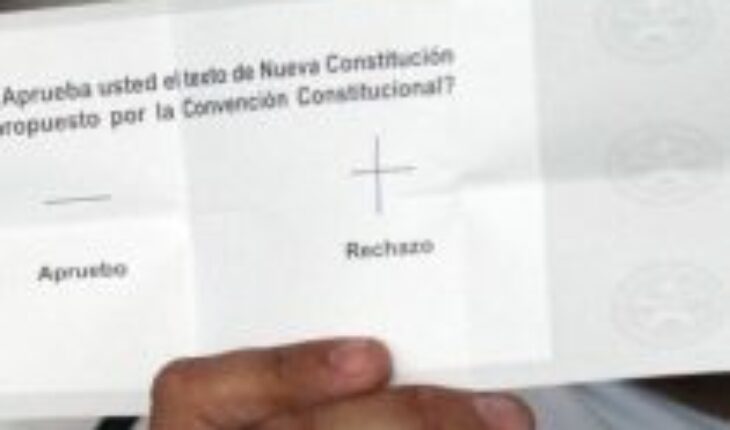“History advances on its negative side,” said sociologist René Zavaleta Mercado, about the constant defeats of the popular sectors, and the permanent capacity of the elites to impose and reimpose again and again a project obstructive to transformative attempts.
Historical course that can also be facilitated by the progressive sectors themselves, when they distance themselves from the popular ones, in terms of not representing their “feeling” and deeper unreformed conceptions. Thus leaving them in a condition of availability for restoration projects of the old order, as happened a few hours ago in Chile during the exit plebiscite, with the important triumph of the rejection of the new constitutional project, achieving 61.87% versus 38.13% of the approval.
A result that can be explained, among other factors, as a result of the distance between the sectors present at the Constitutional Convention and the popular masses – something otherwise typical of the Chilean left-wing political culture – who assumed to represent “intellectually and morally” the new “coherent common feeling” that emerged from the outbreak of October 2019.
This as a consequence of a diagnosis made by the progressive intelligentsia on the explanatory factors of the social outbreak of 2019, which ultimately overstated the culturalist, identity, subjective and post-material aspect. As will be identified in the draft constitution, which emphasized issues such as diversity, autonomy, pluralism and difference. This above other material, economic and unitary identity aspects common in State-National terms, typical of a mostly mestizo composition of the population, around 80%.
Social sectors, in addition, mostly linked to impoverished popular and middle classes, who share a “dis-ease” as a common experience of the “hard life” product of inequality, low wages, over-indebtedness and vulnerability typical of 40 years of neoliberalism as Martuccelli points out in his book “The outbreak in Latin American key” (Lom, 2021), whose demands were subject to the deadlines and forms of a constituent process agreed by the elites, as an institutional way out of the crisis.
In this sense, the sociologist Manuel Canales, clearly pointed out during the development of the deliberative process of May 2022 that “the constituent advances are extraordinary, but they are not the priorities of October. I fail to understand why economic and social rights are left for the end of the process.”
All in a context of political-cultural and hegemonic learning of the Chilean right, as will be expressed in the formation of a new alliance with fractions of the political center and independent sectors of civil society, who thanks to an important economic and media power available – and that together with an important strategy of media manipulation – were able to appeal to the “common sense” and “fears” of the upper layers, urban and rural middle and popular of the country, bearers of traditional conceptions of family life, aspirational and individual. As well as heirs of a strong State-National tradition.
Popular rejection that materialized in “the margin of triumph of the Rejection option was wider in the communes belonging to the lowest income quintile than in those with the highest incomes in the country. The difference in the lower income communes reached 50 percentage points,” according to the recent communal analysis on the voting decision of the exit plebiscite carried out by Fernández and Guzmán of the government faculty of the Universidad el Desarrollo.
Specifically, while the approval sectors emphasized diversity and autonomy to justify a new common state project, the rejection used the flag as a symbol of national and territorial unity, associating the consultation with an evaluation of the presidential management of the day. Thus allowing them to score an important victory in the exit plebiscite, but still far from offering a common national project that allows the formation of a new historical bloc, around their leadership and their old neoconservative recipe.
It is a defeat that must also mean an intellectual challenge no less for Chilean progressivism, with respect to offering its own formula for the national reality, and that allows to rearticulate around a common project the demands of pluraliAutonomy, socio-environmental and democratizing.
But without making invisible those of a material, economic and cultural order that make sense of the great national majorities and their territories, considering that, as Gramsci said: “the popular element feels, but does not always understand or know; the intellectual element “knows, but does not always understand or “feel” (Gramsci, 2001:346).
So necessarily, the formation of a new historical bloc will go through another relationship between “rulers and the governed”. Or between intellectuality and people, where both are able to form a coherent “sense-passion”, which “becomes understanding and therefore knowledge (…), only then is the relationship of representation (and) life as a whole is realized, which is the only social force” (Gramsci, 2001: 347).
Follow us on
The content expressed in this opinion column is the sole responsibility of its author, and does not necessarily reflect the editorial line or position of El Mostrador.





